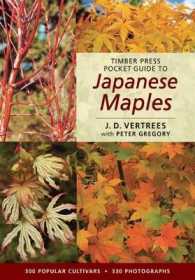- ホーム
- > 洋書
- > 英文書
- > Literary Criticism
Full Description
Examines the theory and practice of nonfiction narrative literature in twentieth-century Mexico.
Winner of the 2012 Best Book in the Humanities presented by the Mexico Section of the Latin American Studies Association
In the turbulent twentieth century, large numbers of Mexicans of all social classes faced crisis and catastrophe on a seemingly continuous basis. Revolution, earthquakes, industrial disasters, political and labor unrest, as well as indigenous insurgency placed extraordinary pressures on collective and individual identity. In contemporary literary studies, nonfiction literatures have received scant attention compared to the more supposedly "creative" practices of fictional narrative, poetry, and drama. In Documents in Crisis, Beth E. Jörgensen examines a selection of both canonical and lesser-known examples of narrative nonfiction that were written in response to these crises, including the autobiography, memoir, historical essay, testimony, chronicle, and ethnographic life narrative. She addresses the relative neglect of Mexican nonfiction in criticism and theory and demonstrates its continuing relevance for writers and readers who, in spite of the contemporary blurring of boundaries between fiction and nonfiction, remain fascinated by literatures of fact.
Contents
Acknowledgments
Introduction
1. The Distinction of Nonfiction: Toward a Theoretical Framework
2. Writing the Mexican Revolution of 1910
3. Living Stories, Telling Lives: Autobiographical Writings of José Vasconcelos and María Luisa Puga
4. Life Writing from a Popular Perspective
5. Chronicling Crisis: Late Twentieth-Century Manifestations of the Literature of Encounter
6. Making History: Subcomandante Marcos in the Mexican Chronicle
Conclusions: Thinking Back, Looking Ahead
Notes
Works Cited
Index








